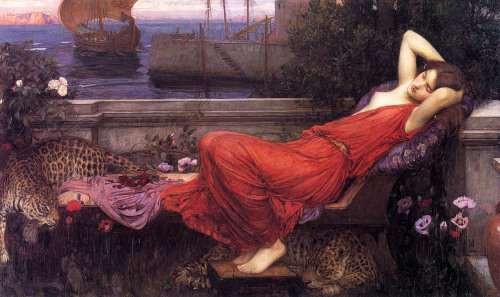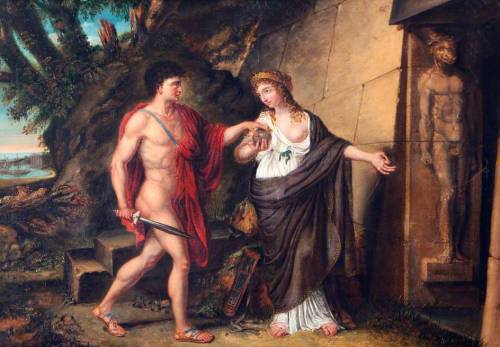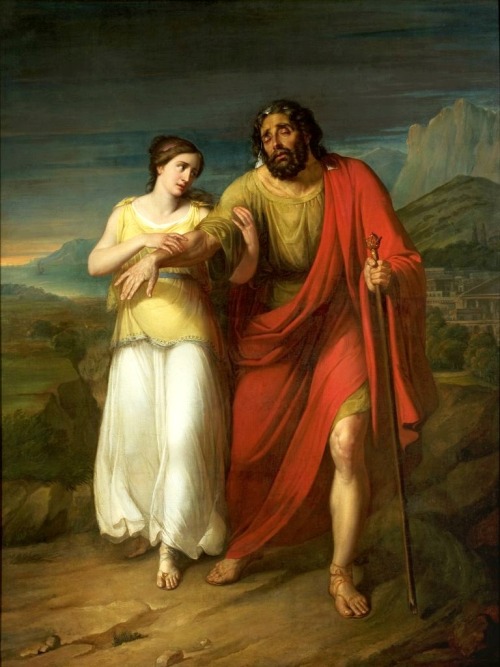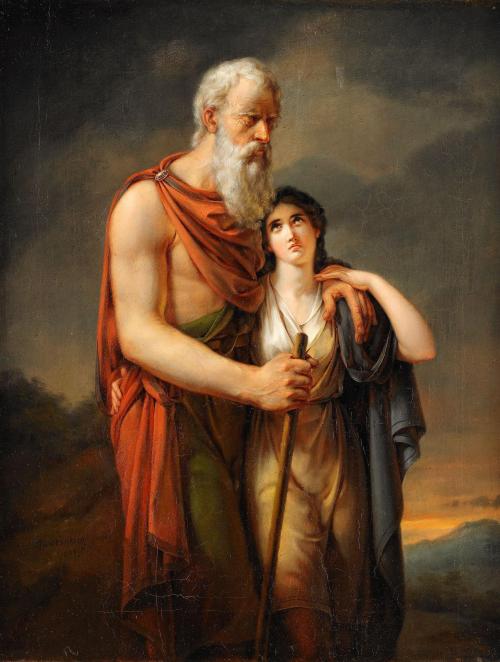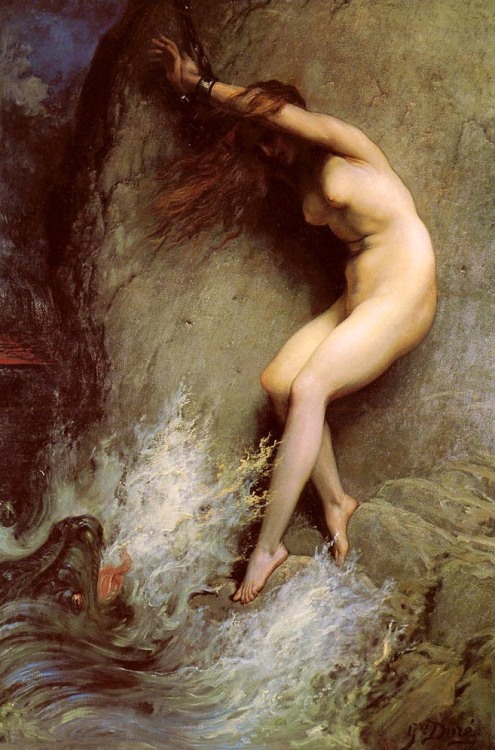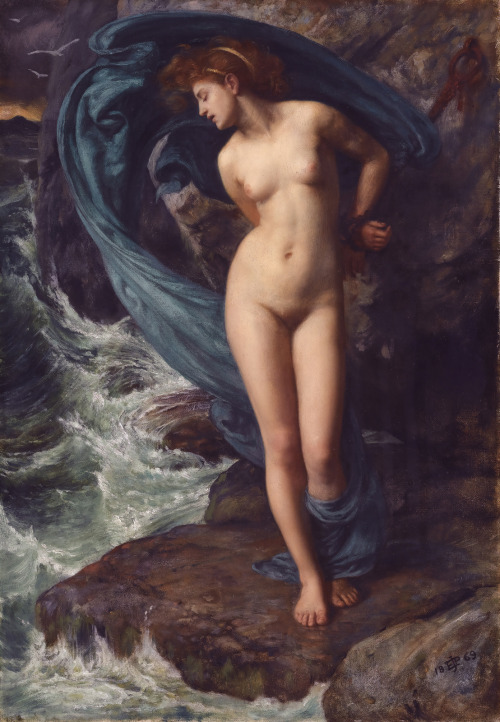#greek heroine
1. I sing of the Mistress of the Labyrinth, holy maid, with rich, wine-dark tresses and golden crown, keeper of the Bull, Goddess of the crops, Holy Asasara, Princess of Heaven. The jewel of her crown is the starry sky.
You toss your head in dance, upturn the soil and let life burst forth: the blossom and fruit; the calving and women crying out in travail, then turn your gaze toward the North Wind, leaving the Earth fallow and silent.
Mournful are those who see not the face of Asasara: dust is their drink, and clay their food. Sackcloth is their garment. Joyous are those upon whom she looks: their flocks are numerous, their harvest without measure, their cups are never empty.
Many times born and many times dead is Asasara, for she loved life, and loved the living world, but all that is born must die, and all that begins must end: this is her law, enduring forever. To Earth she came in the form of a maid, and Ariadne was her name among men.
Come forth, Asasara, Ariadne, and alongside the golden-haired Muses, inspire me to tell your tale.
2. Hail to the maid of whom Pasiphae bore, sister to to the blessed Minotaur! Surpassing the Fates in weaving, voluptuous, clever and subtle, beloved Ariadne.
You are like storm and fire and ice, loud-lamenting, wild-rejoicing. The sea-girt land trembles in the wake of your frenzied dancing, the deep-billowing sea shudders at your weeping, the deluge and gail bow to your rage.
A subtle mind had Ariadne, surpassing the genius of mortal men by leaps and bounds. To her were given the secrets of the knot-work, her mysteries were told even unto the lands of Phrygia.
Hail to the Lady of the Golden Thread who gave to Theseus, famed abductor of women, a klew, that he should not have to slay the sacred Bull, but he killed it nonetheless and stole away from Crete with Ariadne and her mortal sister in tow.
Lo, the land of Minos rattled, and bull leapt not on cow, nor did the Earth give fruit there, for the spirit of Asasara departed with her.
The souls of ancient kings gave testimony: “Never more shall we receive offerings from our descendants, if Ariadne’s soul does not return. The whole land will be empty of everything but dry sand, salted earth and the bleached bones of man and beast alike.”
“Return,” cried the maid of animals, “Remember yourself, Asasara, and return to your people.”
Ariadne did not her nor answer, but deep within her heart, the soul of Asasara awoke and became restless. The deep bosom of the sea was troubled, and the storm rose up at her gaze. Loud-crashing thunder and lightning bolts made the tall waves of the ocean glow like a dozen moons, until the ship and crew were forced to come ashore at a place called Dia.
Furious Thalassa stood up and threw herself upon the sand there, and black clouds shot white-hot bolts at the hills as the winds tore apart trees, crying, “Blasphemy!”
“On account of this foreigner,” said Zagreus, “My grotto is being destroyed.”
And Artemis let loose silvery arrows, setting free the soul of Asasara from mortal flesh. You died a maiden at the hand of a maiden, but to flesh you longed to return. A libation of honey-wine to Asasara is due, but I shall go on to tell another tale.
3. Cursed is Theseus, cursed is he, who received many gifts at the hands of Goddesses, but honored them not. In his youth he bore Ariadne away, but had no joy in her. In his old age, he bore her away a second time, but finding her pregnant, he abandoned her in a no-man’s land, and she died before ever giving birth.
When she arose again in Knossos, Dionysos appeared at the first bloom of her womanhood, and took her as his buxom bride, for even in her childhood, her beauty was like that of a goddess.
He was married to her, saying, “I will never have another.”
4. I sing of Ariadne, fearsome warrior, leader of Sirens, leader of the dancing daughters of Poseidon, frightful Ariadne of leather armor and copper swords.
Alongside Dionysos, Ariadne of the ghastly wail and rapturous song, did battle against the armies of Perseus for the sake of her Bride-groom’s name. Leading the sirens in dance, she turned, whirling, the sun glinting off of polished copper, making wine-dark hair shine golden, showing her divine inheritance.
Alongside mighty warriors, and the monstrous Kyklopai Ariadne fought. Perseus saw the frenzied sea-maidens, heard the song of the sirens, took aim and pierced the side of dread-dancing Ariadne with a thrown spear, but the dancing of Ariadne was not slowed. Blood soaked the Earth, yet feet still trampled, eyes still flashed, and the hideous, bewitching song, unending, caused warrior after warrior to fall, as whirling swords with frightful glint made black blood rain upon the dusty ground.
In despair, Perseus unveiled the dread visage of Medusa turning the holy maid, still fragrant from her martial bed, into a stone. Time, sand and tide have washed away her face, in the frozen grip of battle’s ecstasy, but to this day, the stone remains, and to those who are close to the brink of madness, her song can still be heard.
Great was the sorrow of her husband, and madness has gripped him ever since. The Gordion knot was cut by a sword, and his names fell into threads and ribbons. He walked the labyrinth but did not find the soul of Ariadne, and so he went to Athens, and established days in honor of her. In the Winter he searches the depths of Hades, in the Spring, the women draw lots, that Princess Ariadne might be revealed, and again become his Queen, but she is not to be found.
Lo, Ariadne stands as a stone in the lands of Perseus, but the soul of Asasara yet lives, and all things that die are born again, for such is her law.
To Asasara, give tokens of sea-shells, and she shall fasten a waist belt from the bounty of the sea with a thread spun from silver, but listen, for I have yet another song.
5. I sing of Ariadne, jilted lover of the wine-dark god.
Let your sharp tongue tell of his deeds, that famed son of woman-mad Kronion, who promised you fidelity, but gave it not. Thrice slain by his hand: In the grotto of Dia, once when you were great with child, and lastly, let it be told of how he used his fame as a hammer against you, telling only of mortal Ariadne while denying Queenly Asasara, the goddess of Crete.
Tell of how he, seeking to usurp your power, O Mistress of Life and Death, threw your crown into the vault of the star-spangled sky, that it might never again return to Earth.
The wrath of Ariadne shook the Earth, and the lands of Minos were torn asunder with fire and drowned by deep-swelling, secret-keeping Thalassa as payment for the slight, in that place where Dionysos was accorded honor in place of holy Adnon.
The Labyrinth of the Holy Maid was never seen again.
“Cursed are they,” said Asasara, “Who diminish me. Cursed are they who cause other gods to be worshipped in my temples. Let it also be so for them, that lesser beings will come and cast them out of their temples, and let them wander as I wander, and hunger as I hunger. To those who would not make a place for me at their table, let them drink as horses drink, from perpetually muddy water.”
6. But now, Muses, let me sing of Repentent Asasara and gentle Ariadne, five times born and five times dead, awakening in darkness, and in darkness born anew, springing forth from the chasm of the Earth on an immortal mare of fiery breath and gusting mane, crowned with gold and armed with copper, ungirt Ariadne with unbound tresses.
Hail to you, Ariadne, that neither stone, nor the bonds of marriage could hold, nor even the icy grasp of death, for on this day, you ride forth from the silent darkness of Hell, and into the light of Dawn.
On this day, trample jealousy as you ride, and let love’s law be love alone. Trample retribution and vengeance under hoof, summon once more the sea maidens to sing their requiem.
Toss your head in dance, once more, holy maid, and shatter the bonds of the oppressed with loud laughter!
Aphrodite and Ariadne, honored as one, let love be set loose — If laws against love be written on stone, let stone shatter. If they are written on paper, then let paper burn. If they are dye upon cloth, let the ink run away like blood.
With great and overflowing mercy, call back your diadem from among the stars, and let the power of Asasara be known once more in the world of men.
To you, Asasara, Ariadne, Hail, and may a drink be offered to all the gods in your name.
Lost Hymns to Ariadne 1-3
Post link
The buried voice bespake Antigone.
‘O sister! couldst thou know, as thou wilt know,
The bliss above, the reverence below,
Enkindled by thy sacrifice for me;
Thou wouldst at once with holy ecstasy
Give thy warm limbs into the yearning earth.
Sleep, Sister! for Elysium’s dawning birth, -
And faith will fill thee with what is to be!
Sleep, for the Gods are watching over thee!
Thy dream will steer thee to perform their will,
As silently their influence they instil.
O Sister! in the sweetness of thy prime,
Thy hand has plucked the bitter flower of death;
But this will dower thee with Elysian breath,
That fade into a never-fading clime.
Dear to the Gods are those that do like thee
A solemn duty! for the tyranny
Of kings is feeble to the soul that dares
Defy them to fulfil its sacred cares:
And weak against a mighty will are men.
O, Torch between two brothers! in whose gleam
Our slaughtered House doth shine as one again,
Tho’ severed by the sword; now may thy dream
Kindle desire in thee for us, and thou,
Forgetting not thy lover and his vow,
Leaving no human memory forgot,
Shalt cross, not unattended, the dark stream
Which runs by thee in sleep and ripples not.
The large stars glitter thro’ the anxious night,
And the deep sky broods low to look at thee:
The air is hush’d and dark o'er land and sea,
And all is waiting for the morrow light:
So do thy kindred spirits wait for thee.
O Sister! soft as on the downward rill,
Will those first daybeams from the distant hill
Fall on the smoothness of thy placid brow,
Like this calm sweetness breathing thro’ me now:
And when the fated sounds shall wake thine eyes,
Wilt thou, confiding in the supreme will,
In all thy maiden steadfastness arise,
Firm to obey and earnest to fulfil;
Remembering the night thou didst not sleep,
And this same brooding sky beheld thee creep,
Defiant of unnatural decree,
To where I lay upon the outcast land;
Before the iron gates upon the plain;
A wretched, graveless ghost, whose wailing chill
Came to thy darkened door imploring thee;
Yearning for burial like my brother slain; -
And all was dared for love and piety!
This thought will nerve again thy virgin hand
To serve its purpose and its destiny.’
She woke, they led her forth, and all was still.
Swathed round in mist and crown’d with cloud,
O Mountain! hid from peak to base -
Caught up into the heavens and clasped
In white ethereal arms that make
Thy mystery of size sublime!
What eye or thought can measure now
Thy grand dilating loftiness!
What giant crest dispute with thee
Supremacy of air and sky!
What fabled height with thee compare!
Not those vine-terraced hills that seethe
The lava in their fiery cusps;
Nor that high-climbing robe of snow,
Whose summits touch the morning star,
And breathe the thinnest air of life;
Nor crocus-couching Ida, warm
With Hera’s latest nuptial lure;
Nor Tenedos whose dreamy eye
Still looks upon beleaguered Troy;
Nor yet Olympus crown’d with gods
Can boast a majesty like thine,
O Mountain! hid from peak to base,
And image of the awful power
With which the secret of all things,
That stoops from heaven to garment earth,
Can speak to any human soul,
When once the earthly limits lose
Their pointed heights and sharpened lines,
And measureless immensity
Is palpable to sense and sight.
Antigone by George Meredith
Post link
Now Time’s Andromeda on this rock rude,
With not her either beauty’s equal or
Her injury’s, looks off by both horns of shore,
Her flower, her piece of being, doomed dragon’s food.
Time past she has been attempted and pursued
By many blows and banes; but now hears roar
A wilder beast from West than all were, more
Rife in her wrongs, more lawless, and more lewd.
Her Perseus linger and leave her tó her extremes?—
Pillowy air he treads a time and hangs
His thoughts on her, forsaken that she seems,
All while her patience, morselled into pangs,
Mounts; then to alight disarming, no one dreams,
With Gorgon’s gear and barebill, thongs and fangs
Andromeda by Gerard Manley Hopkins
Post link

